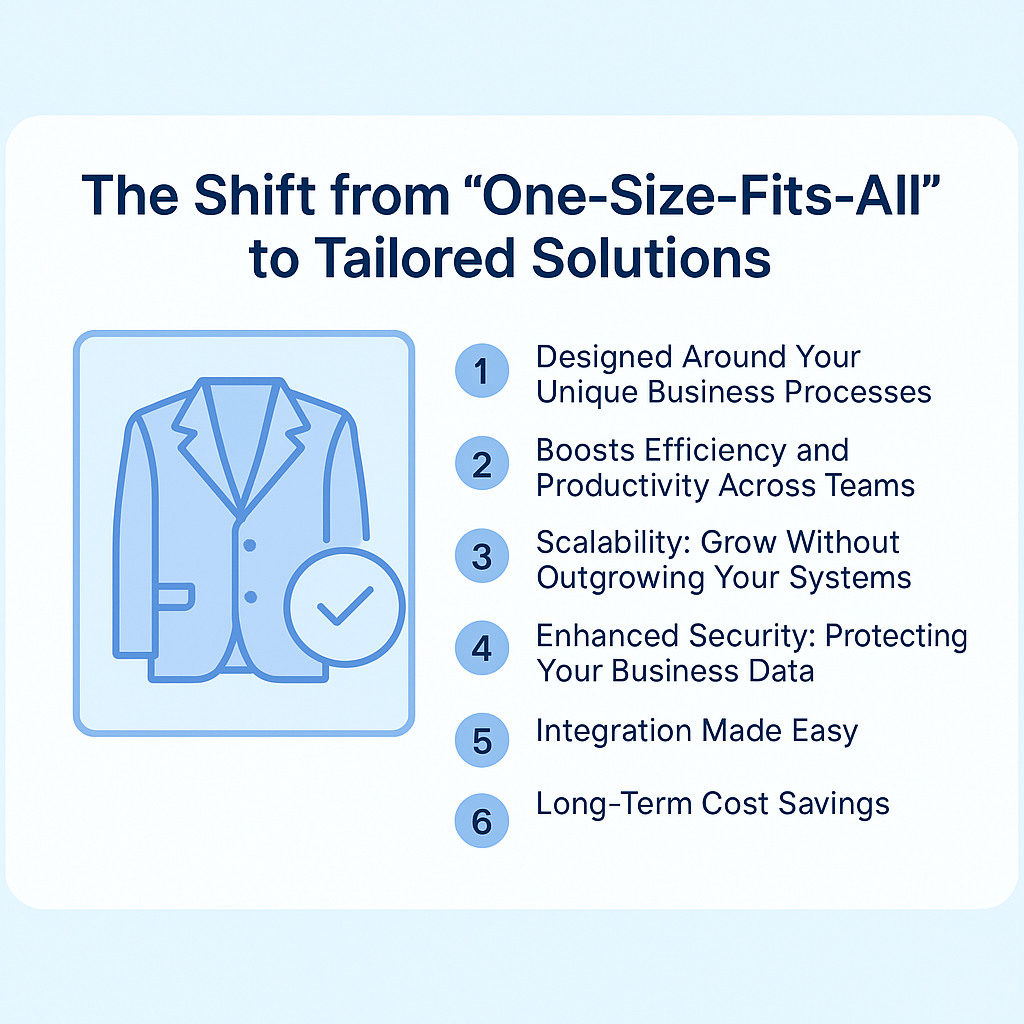
By Samar Ayub - 4/27/2025
The Shift from “One-Size-Fits-All” to Tailored Solutions
Picture this you are buying a suit for the biggest meeting of your career — but instead of getting one tailored to your size, you grab a random off-the-rack piece.
It’s close enough… but it doesn’t quite fit right. It looks awkward, feels uncomfortable, and you just don’t move as confidently.
That’s exactly what using generic software feels like for businesses today.
Sure, it might work — but it won’t feel natural, efficient, or truly aligned with what your business needs.
Custom software development is like getting that tailored suit — made just for you, perfectly fitting your goals, processes, and vision.
In today’s blog, we’re diving deep into why custom software has become a game-changer for businesses across industries — and top benefits of custom software development for businesses.
1. Designed Around Your Unique Business Processes
Every business is different.
Even two companies in the same industry can have totally different workflows, customer types, management styles, and needs.
Off-the-shelf software forces you to change your processes to fit their system. Custom software, on the other hand, is built to match your processes, not the other way around.
Benefits:
- No unnecessary features: Every function serves a real purpose.
- Full flexibility: You can tweak the software as your operations evolve.
- Faster adoption: Employees find it easier to learn and use software built around their day-to-day tasks.
When your software understands your business as well as you do, magic happens.
2. Boosts Efficiency and Productivity Across Teams
Have you ever noticed how much time is wasted switching between apps, manually updating data, or working around a system that “kind of” fits?
Custom software is designed to make your team’s life easier — removing hurdles, simplifying workflows, and automating repetitive tasks.
Here’s how it helps:
- Automation of routine tasks like data entry, approvals, and reporting.
- Real-time data access across departments.
- Customized dashboards showing the KPIs that matter most to you.
The result?
Less frustration. More output. A team that can focus on strategic tasks rather than getting bogged down by inefficiencies.
3. Scalability: Grow Without Outgrowing Your Systems
Most off-the-shelf solutions have limits.
Maybe they can only handle a certain number of users.
Maybe performance drops when your customer base doubles.
Maybe upgrading to “enterprise” features costs a fortune.
With custom software development, scalability is built-in. Your system can grow with you, adapting to increased workloads, expanded features, or new user types as needed.
Why scalability matters:
- Future-proof investment: No need to start from scratch every few years.
- Cost savings: Avoid expensive migrations or new platform purchases.
- Flexibility: Add, modify, or remove features as your business model evolves.
Growing pains are real — but the right software can cushion the impact.
4. Enhanced Security: Protecting Your Business Data
Cyber threats are no longer a distant worry; they’re a daily reality.
Especially for businesses dealing with sensitive customer information, intellectual property, or financial data.
Custom software can be built with security as a priority — not just an afterthought.
Security benefits include:
- Custom authentication systems tailored to your needs.
- Advanced encryption protocols for sensitive data.
- Controlled user access with multi-level permissions.
- Proactive threat monitoring and quick patching of vulnerabilities.
And because custom solutions are less widespread, they are less attractive targets for mass-scale cyberattacks.
In today’s digital economy, trust is currency — and nothing builds trust faster than strong security.
5. Integration Made Easy
In a typical business day, you might use:
- A CRM for sales
- An ERP for operations
- A marketing automation tool
- Financial software
- HR management platforms
Jumping between multiple systems wastes time and often creates errors.
Custom software development allows you to integrate everything into one coherent system — or at least ensure seamless data flow between different platforms.
Imagine a world where:
- Customer information updates everywhere instantly.
- Sales data automatically syncs with your invoicing system.
- Inventory levels update in real-time across your supply chain.
That’s the power of smart integration — and custom software makes it effortless.
6. Long-Term Cost Savings: Invest Once, Reap Forever
At first glance, buying a ready-made solution might seem cheaper.
But when you factor in recurring licensing fees, paid upgrades, third-party plugins, additional user fees, and the cost of workarounds, off-the-shelf software quickly becomes expensive.
Custom software may involve a higher initial investment, but the long-term ROI is usually much stronger.
Here’s why:
- One-time development cost (plus optional maintenance).
- No ongoing licensing fees.
- Tailored efficiency savings through automation and integration.
- Reduced training and onboarding costs.
Custom software is like buying a house versus renting an apartment — one builds equity; the other just racks up bills.

7. Competitive Edge: Outpace Your Rivals
When everyone uses the same tools, innovation stalls.
Custom software allows you to differentiate yourself in ways that mass-market solutions never can.
Think about it:
- A custom customer portal with features that no competitor offers.
- An internal system that allows you to deliver services faster.
- Automated insights that give you an edge in market analysis.
Having unique digital tools gives you first-mover advantage, faster reaction times, and a stronger brand identity in your market.
If you want to lead, not follow, customization is the key.
8. Dedicated Support: No More Waiting in Line
Have you ever tried calling support for a big-name software platform?
- Endless hold times
- “Ticket escalations”
- Generic advice that doesn’t apply to your situation
With custom software, you have direct access to the developers who built your system.
That means:
- Faster bug fixes
- Easier upgrades
- Personalized recommendations based on your exact setup
No more wasting time explaining your business to tech support reps who don’t understand it.
9. Greater Control Over Updates and Features
Off-the-shelf products update on their own schedules — often adding features you don’t need or changing interfaces you’ve gotten used to.
With custom development, you control the roadmap.
You decide:
- When to add new features
- What upgrades to prioritize
- How the user interface evolves
This flexibility ensures that technology serves you, not the other way around.
10. Higher Employee Satisfaction
Finally, let’s not forget your team.
Good software isn’t just about processes and profits — it’s about people.
When employees have to fight with clunky, mismatched tools every day, morale drops.
When they get software that feels natural, speeds up their work, and reduces friction, satisfaction soars.
And happy employees:
- Work harder
- Stay longer
- Deliver better customer service
Employee experience is one of the most underrated benefits of custom software development — but one that pays enormous dividends.
Conclusion: Custom Software Is an Investment in Your Business DNA
In a world where customer expectations are sky-high, markets shift overnight, and competition is fierce, generic solutions just don’t cut it anymore.
Custom software development isn’t about “adding another tool.”
It’s about crafting a foundation — a living, evolving system that reflects the very DNA of your business.
From improved efficiency and security to better scalability and long-term savings, the advantages are real — and they’re transformative.
If you’re serious about building a future-proof, competitive business, it’s time to think custom.
Because your business deserves more than a one-size-fits-all solution.